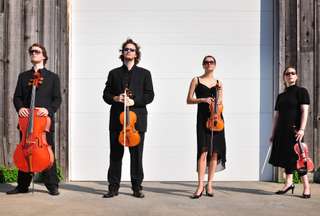|
Back
Upon the River, Beyond the C New York
BargeMusic, Fulton Street Landing
07/23/2010 - & July 24, 25, 2010
Terry Riley: Sunrise of the Planetary Dream Collector – String Quartet – The Wheel/Mythic Birds Waltz – G-Song
Lou Harrison: String Quartet: Variations on Walther von der Vogelweide’s “Nu alrest leb-ich mir werde”
Voxare String Quartet: Emily Ondracek, Galina Zhdanova (Violins), Erik Peterson (Viola), Adrian Dauroy (Cello)

The Voxare Quartet (© Courtesy of the artists)
The difference between Terry Riley and his contemporaries is that Terry Riley always seems to be having fun when he writes.
After 75 years–his three-quarter mark is being celebrated around America this week–Terry Riley is something of an imp. When I heard him two years ago chanting and playing the synthesizer, the ragas were of equal importance as the hirsute composer enjoying the sounds. When his first work on this concert at BargeMusic was played last night, one didn’t think of the title, Sunrise of the Planetary Dream Collector. One thought it sounded like a gaggle of string players at a California Garlic Festival or a wine-stamping jamboree, offering some Celtic songs and improvising on the joy of the music.
That isn’t exactly true. Mr. Riley is a fastidious composer whose eclectic music has reason as well as rhyme behind it. He has not simply changed various modes during his long career, but he has added them to his repertory, allowing different musics to be garbed with colors and styles as he sees fit. He may be best known for for In C, but the years have brought the most variegated colors and sounds.
Yes, the early String Quartet (written almost a half-century ago) seems to reek much of the John Cage String Quartet with its silences, its individual notes, its low musings on individual strings. Mr. Riley’s influences by Cage and Le Monte Young are great–but his explanation is more pictorial, more accessible. The greatest influence, he has explained was the sound of the foghorn. (Or more apparently the multiple sounds of foghorns drifting up from San Francisco Bay.)
When the Voxare Quartet played his The Wheel/Mythic Bird Waltz, one didn’t hear much of a wheel…or birds…or even a waltz. Never mind. While knowing that the first work is improvised from a Riley original ballad, and the rest comes from the Indian tala rhythms which he loves so well, the birds and waltz and wheel are quite irrelevant.
Mr. Riley loves his sounds above all. As a classical and jazz pianist originally, he rarely wrote for mere strings. But members of the Kronos Quartet kept telling him that they had heard a string quartet in his music. When he started to write for them, the effect on his own mind–adding to the serious, the jazz, the Indian, the stasis, the Californian dreaming, the wildly eclectic–inspired him to write far more for the Kronos.
Voxare Quartet is no Kronos, which makes his concert all the more interesting. As a half-Russian half-American quartet, all Juilliard graduates with a stunning track record, they were obviously having fun with Riley’s music. I couldn’t think of a better example than Riley’s G-Song. On one layer, we hear the Voxare Quartet descending and ascending in different patterns up and down the G scale. On another texture, the rhythm is just angular enough that we can hear a tension, a suspense when they can get in sync. At the same time, a kind of semi-jazz harmonic progression gives it bumptious bluesy feel.
The result is not simply the joy of Terry Riley, but a multi-layered, questioning, answering, in-sync out-of-sync roller-coaster ride for 16 strings.
Whew!!
The final work was from one of Riley’s friends, the late Lou Harrison. Harrison was more geographically eclectic than Riley, and this longish part of his String Quartet Set encompassed a 13th Century song (variations on a piece by the euphonically-named Walther von der Vogelweide’s Palestine Song written apparently for a Crusader entourage), Arabic-style drumming, chanting, and a Turkish musical ending, played for three of the instruments in unison, only cellist Adrian Daurov rapping on his instrument with resonating wonders.
I like to imagine that Harrison wrote about this 13th Century song because of the translated words, “Christians, Jews and Heathens all claim this land as their own ... All the world struggles over it” As if Mr. Harrison knew that the Middle East war had been continuing for 800 years, that nothing changes in this world but music.
Tonight, the Voxare Quartet continues at the enchanting BargeMusic site at 8pm, and Sunday at 3pm. One would imagine that the spirit of Walt Whitman, whose poem adorns the railing by the water, loves the show.
Harry Rolnick
|